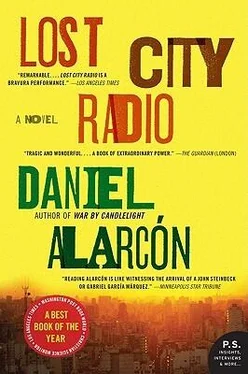“If you were, why would you tell me?”
“Because I like you.”
There was something so confident about him, so brash, it was almost distasteful — except it was intoxicating. She remembered this night: the dancing and the drinking, their easy and light conversation in the early morning hours, so enthralling they didn’t even notice the bus ease to a stop, or the idling rumble of the motor, or the flashing lights. It was a roadblock, only a few stops from her house. She remembered apologizing to Rey for the hassle, after he had come all this way to drop her off. Rey frowned but said not to worry.
Then a soldier was aboard, holding a flashlight in one hand, his right arm resting on the barrel of his rifle. Rey took two quick puffs from the end of his cigarette and tossed it to the sidewalk. He exhaled into the bus. The soldier took his time, let his gun do the detective work, and each tired passenger handed over identification papers without argument. When the soldier got to them, Norma took a good look at him and realized he was young, just a kid. It emboldened her, or maybe she just wanted to impress Rey.
“You don’t have to point that thing at me,” Norma said, handing the soldier her ID. “I’m not going anywhere.”
“Be quiet,” said Rey.
The young soldier scowled. “Listen to your boyfriend.” He patted his gun gently, as if it were an obedient child. “Where’s yours, boyfriend?”
“I don’t have identification, sir,” Rey said.
“What?” the solider barked.
“I’m sorry. It’s at home.”
The soldier examined Norma’s ID under the flashlight, then handed it back. “There’s always a wise guy,” he mumbled, turning to Rey, then leaned over them out the window and yelled for an officer. “You’re coming with us,” he said to Rey. “Sorry, girlfriend, looks like you’re going home alone.”
A quiet panic seized the bus. Every head turned to face them, though no one made eye contact. Only the driver pretended not to notice: he held the steering wheel tightly and looked straight ahead.
“I’ll go,” Rey said quietly. “We’ll straighten this out. My ID is at home. It’s no problem.”
“Good,” the soldier said. “We all hate problems.”
“Where are you taking him?” Norma said.
“You want to come?” said the soldier.
“No, she doesn’t,” Rey answered for her.
They led him off the bus. Norma watched from the window as they put Rey in a green military truck.
There were only a few more stops to her house. Norma rode them in silence, the cool air in her face, aware that everyone was aware of her. She felt young and frivolous: she was a drunk girl coming home from a party when everyone else, it seemed, was shaking off sleep, on their way to work. They felt no pity for her. Fear perhaps, or anger. As she got off, she could feel the bus exhale, as if she were a bomb that might have exploded, and now they were finally safe.
It was at her front door, as she was digging in her pockets for her keys, that she found Rey’s ID card. Or rather, it was his picture. The name belonged to someone else.
OF COURSE, he’d heard Norma’s voice before. In 1797, the owner of the village’s canteen had a good radio, with an antenna long enough to get a signal from the coast, and so, each Sunday, the women and the children and the remaining men crowded in to listen. It was what they did instead of church. They gathered an hour before to eat and drink and gossip. Potatoes, mushy overripe fruit, and thin silver fish salted in broth. Loud voices, the beginnings of a song. They brought portraits of their missing, simple drawings that an itinerant artist had done years before. They hung these on the walls, rows of creased and smudged faces Victor didn’t recognize, whose mute presence made the village seem even smaller. Then, at eight o’clock, there was a hush, and static, and that unmistakable voice through the tinny speakers: Norma, to listen and heal them; Norma, mother to them all.
They were waiting to hear the names of those who had left. Boys, some only a few years older than Victor, wandered away, leaving 1797 emptier and smaller each year. They grew up and became men elsewhere. A few returned, after being gone for years, to choose a wife and take her away, or to tend their father’s plot of earth. But most never reappeared. It was all the women spoke of: where had their husbands gone? Their sons? Sad mothers still lamented the days of forced conscriptions, when their boys had been rounded up in the plaza and given rustic wood carvings in the shapes of machine guns. The children fell on their stomachs and slithered across the dirt; the mothers watched them, terrified: oh, how they played.
Victor had heard all the stories. Even when he was a boy of six, with the war long over, his mother sent him to hide in the trees whenever an army truck belched its way into the village. He watched from the forest: angry sergeants picking carefully between the plumpest chickens, ordinary soldiers carrying rucksacks bulging with fruit. Did the soldiers notice the village had no young people? When the truck left, Victor and all the other boys emerged from the jungle to be received by their mothers with kisses and tears. Everyone knew the children who left on green trucks never came back.
Some left for work, especially since the war ended and there was no more need for fighters. Mostly to the capital, or to labor on the highways being built up and down the coast, or over the spine of the mountains to the sierra. There was always work in contraband along the eastern border, and the fisheries in the north hired anyone willing to work seven days a week. Some, it was said, made it to the beaches, cultivating dreams of foreign women, making a living selling trinkets to tourists. These were the rumors anyway, but really no one knew for certain. There was no resentment toward the lost, only sadness at being left behind. Those who remained placed their hopes on the radio. The village had entrusted a few letters to passing travelers, but nothing had ever come of it. So, they waited for Sunday and the next and the next. Those evenings impressed upon Victor the danger of remembering. His mother, he assumed, was listening for news of that phantom, his father. Victor prayed: that she’ll forget me when my time comes. He planned to set out for the city one day too; he’d known it since he was a little boy. Happiness, he’d decided, was a kind of amnesia.
This is how it happened: Victor went off to school one morning and returned to a house filled with mourners. His mother had drowned, they said. They repeated the words, various women in tones of concern and affection, but none of it made any sense. What would they do with him? The women around him grieved loudly, they wailed and sang dirges in an old language he couldn’t understand. No one explained a thing. No one had to. His favorite place in the village was an empty field at the edge of the jungle, a sometime park, sometime trash dump full of flowering wild plants and lizards with golden eyes, a field alive with the cawing of invisible birds — they can bury me there, Victor thought, they can bury me now because it’s all the same to me. He could feel his fingers tingling. He had the strangest sensation of sinking, a curtain falling, his life going black. The women coddled him, fed him, sang, and prepared his things.
“Can I see her?” he asked.
They took him to the river’s edge. It was swollen with the previous week’s rain, and the water spun and quaked like a living thing. Victor could hear the adults whispering about him: Adela’s boy is here, Adela’s boy. He tried to ignore it. The village was there, and the men who wouldn’t acknowledge Victor — the men who should have saved her — and his classmates, too, all eyes trained on a rock halfway between the shores, jutting above the water line, wrapped fiercely in white foam. His mother’s body cut the current too, slumped, clutching the stone as if it were a life raft when, more likely, it had killed her. The men were trying to string up a safety line from the other bank. They seemed helpless. Above, the skies were clear and deep blue, betraying no trace of the last week’s storms. Her body, Victor realized, wouldn’t stay there forever: the men might reach her before the current carried her away, but, just as likely, they would not. She’d been fishing, one of the women said. She lost her footing in the eddies where blind silver fish gather to eat and be eaten, the village’s staple food. She must have been distracted, because these things never happen. Then the river had carried her here.
Читать дальше












